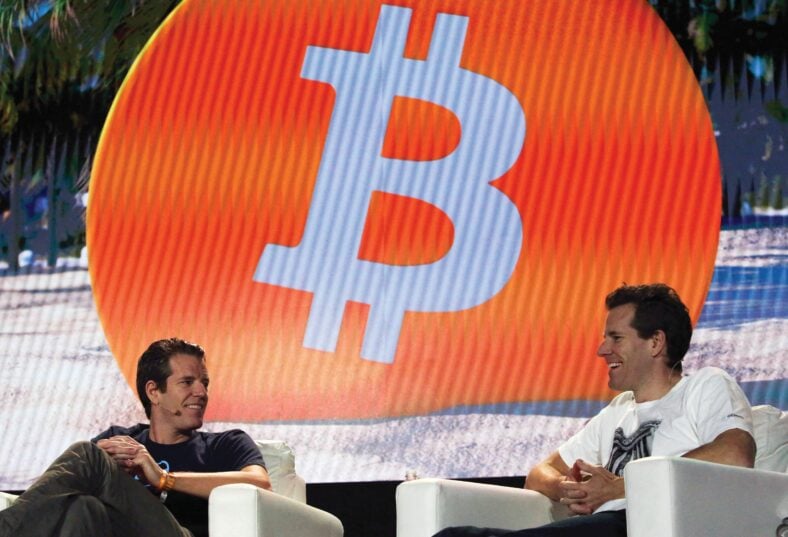
In 2013, four years after Bitcoin (BTC) launched, skepticism surrounding the nascent digital asset was far from waning. Early price swings spurred think pieces describing a financial investment bubble or even fraud, and the world’s first widely adopted cryptocurrency had little to no value as a currency that could be exchanged for goods or services. “People say it’s a Ponzi scheme, it’s a bubble,” Cameron Winklevoss told The New York Times in a piece published that April. “People really don’t want to take it seriously. At some point, that narrative will shift to ‘virtual currencies are here to stay.’ We’re in the early days.”
Cameron and his 6-foot-5-inch twin sibling, Tyler, were then best widely known as the crew-rowing bros who’d won a $65 million settlement in 2008 after a protracted legal battle with Facebook founder Mark Zuckerberg, that recognition being largely due to the story’s somewhat fictitious retelling in 2010’s Oscar-winning film The Social Network. At the time of the aforementioned article’s publication, you could purchase one BTC for $115, and the Winklevosses held $11 million worth.
“It has been four years and it has yet to be discredited as a viable alternative to fiat currency,” Tyler told The New York Times. “We could be totally wrong, but we are curious to see this play out a lot more.”
Wrong, they weren’t. Dug in to the most bullish of positions—Cameron reportedly told CNN Money in 2015, “We’ve never sold a Bitcoin, we’re in it for the long haul”—that initial $11 million investment saw the media declare them “Bitcoin’s first billionaires” by 2017, at which point the value of the BTC had skyrocketed to nearly $11,827, well over a 9,000 percent increase from its 2013 price.

While the Winklevosses may have hit the jackpot, they clearly didn’t see Bitcoin as a lucky speculative investment, but part of an emerging crypto market brimming with untapped potential. Very shortly after revealing the initial Bitcoin investment to The New York Times, the brothers publicly announced their intent to put not just money, but their time, effort, and reputation on the line in launching Gemini, a new cryptocurrency exchange. Built from the ground up to comply with financial laws and regulations, Gemini stood out from other early crypto ventures that were known to operate in legal gray areas.
“In our early experiences with Bitcoin, we found how few people were building Bitcoin exchanges the right way,” Tyler said in a 2016 interview with New York Business Journal. “They really weren’t taking the regulation seriously; they were taking it too much like how you would approach something when you’re 18, full of the excitement of youth and throwing caution to the wind.
“We were passive investors in a Bitcoin company whose CEO went to prison for laundering, which was a valuable lesson for us, because it showed us how to do this the right way,” Tyler added, referencing BitInstant founder Charles Shrem IV, who has since been released. “Since that experience, we’ve taken considerable steps to ensure a higher standard of care. We’ve created a great security system that essentially acts as a more effective form of insurance.”
Gemini officially launched in October 2015 with a notable, consumer trust-building certification that very few crypto exchanges could claim: “We’re licensed by the New York Department of Financial Services, which is the highest regulator in the land for both banks and insurance companies in New York,” Tyler said in a statement. “We have bank exams every six to twelve months, which is a very rigorous process. We want to look and feel just like your other financial service companies, so we spent a lot of time ensuring that we do this the right way.”
Following its launch, Gemini quickly moved to expand its offerings beyond Bitcoin. Most notably, it became the world’s first licensed Ether exchange in May 2016. While also a decentralized digital currency, Ether and the Ethereum network on which it’s used are more ambitious in scope than Bitcoin, which was conceived primarily as a currency to be used as a medium for the exchange of goods and services without the need for intermediaries like banks. Ether, in contrast, is the cryptocurrency (or “gas”) that fuels the Ethereum blockchain network, which is often described as a “world supercomputer” that allows developers to build and deploy decentralized applications (dApps) and smart contracts. From creating financial platforms for lending, borrowing, and trading to drafting insurance policies built on smart contracts that are automatically executed when conditions are met, Ethereum’s applications as a blockchain-based network are almost endlessly vast.
As it evolved to offer more cryptocurrencies—Gemini now allows its users to trade and buy over 70 “coins,” or cryptocurrencies like Bitcoin and Ether that are built on their own native blockchains—the company has remained unwavering in its commitment to market integrity and security. In 2018, it began using Nasdaq’s SMARTS Market Surveillance technology, a system widely used in traditional financial markets, to monitor all its transactions—a fitting development, considering that Cameron had presciently said in a 2015 CNBC interview, “This is our effort to bring Bitcoin mainstream, to build it into a regulatory box. When we think of Gemini. com, it will be like a Nasdaq for Bitcoin.”

The following years saw Gemini undergo a number of System and Organization Controls examinations—independent audits that assess the operational effectiveness and security of businesses—to overwhelmingly positive results. But, like so many ventures in the crypto space, Gemini’s biggest challenge to date came about in part because of 2022’s “crypto winter,” a brutal cryptocurrency-wide downturn punctuated by the notorious collapse of the FTX crypto-trading exchange. A year earlier, Gemini and crypto lender Genesis Global Capital had partnered to launch Gemini Earn, a program that allowed users to earn interest on their crypto by lending it to Genesis. The controversy erupted in November 2022—the same month in which FTX collapsed—when Genesis unexpectedly halted customer withdrawals, citing “unprecedented market turmoil.” This freeze left over 200,000 Gemini Earn users unable to access approximately $900 million in digital assets…and seriously pissed off the Winklevoss twins.
Having worked tirelessly to establish an iron-clad credibility with its user base, they fiercely advocated for Gemini users as the company engaged in legal battles with Genesis and its parent company, Digital Currency Group (DCG). Cameron even went so far as to call out DCG CEO Barry Silbert via an open letter, writing, “There are over 340,000 Earn users that are waiting. It’s important to them, and it’s important to us. Every time we ask you for tangible engagement, you hide behind lawyers, investment bankers, and process.”
Those relentless efforts paid off. By the end of June 2024, Gemini had returned 100 percent of digital assets that had been frozen as of November 2022, including all appreciation. “It’s important to note that the Genesis bankruptcy was not a crypto problem,” the Winklevosses said in a joint statement to Gemini users. “It was old-fashioned financial fraud compounded by a lack of regulatory clarity. To that end, we will continue to fight for clear rules and guidance for our industry that foster both innovation and consumer protection. And we will win this fight. The future is bright.”
It is indeed. In June 2025, Gemini confirmed it had filed for an initial public offering, taking its first steps to becoming a publicly traded company. Gemini has expanded to support over 160 digital assets, including tokens—digital assets built on existing blockchains—like XRP, Dogecoin, and Shiba Inu. Gemini’s inaugural “Global State of Crypto” report, released in partnership with Data Driven Consulting Group, indicates a worldwide growth of crypto adoption. According to the report, roughly half of the Gen Z and millennial global population either are or have been invested in crypto.
Perhaps most encouragingly, Bitcoin has hit multiple record highs in 2025, with the most recent being a breach of $120,000 in mid-July, suggesting a value of over $11 billion on the Winklevosses’ initial $11 million Bitcoin investment. “Orange is the new gold. Bitcoin is gold 2.0, and that’s been true since day one,” Tyler said during a panel discussion with David Sacks, the White House crypto and A.I. czar, at the Bitcoin 2025 conference in Las Vegas. “$100,000 per bitcoin, that’s exciting. But if you take twenty-one million into the above-ground marketplace of gold, really it should be a million dollars a coin.” If Bitcoin goes to $1 million, then the Winklevoss twins will be centibillionaires.
This article originally appeared in Maxim’s September/October 2025 issue.